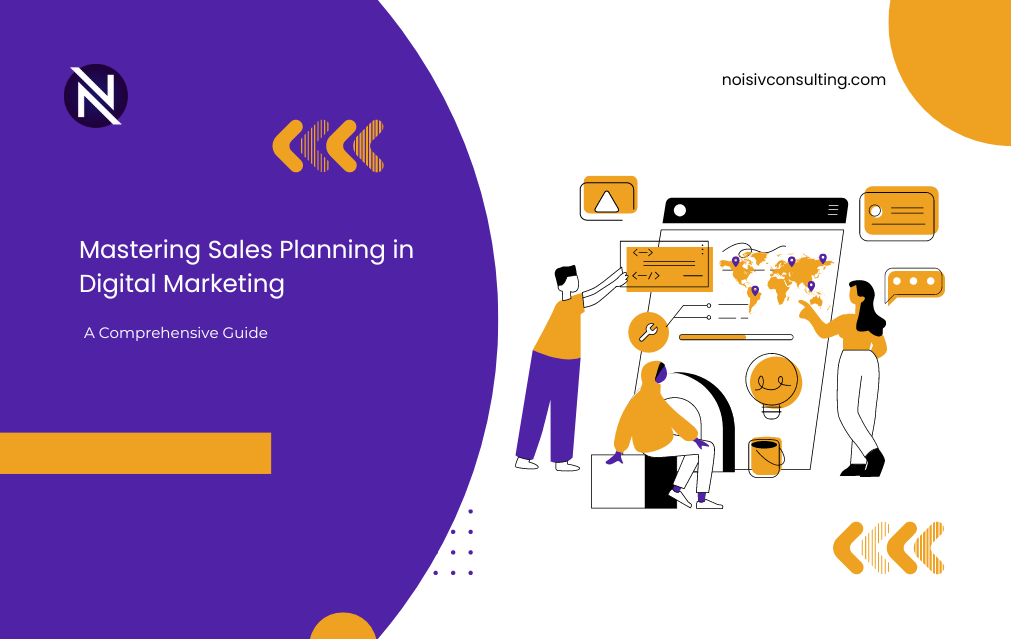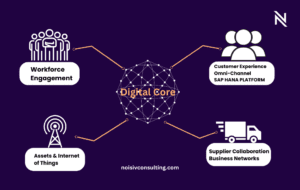In the ever-evolving landscape of digital marketing, where trends shift and algorithms update constantly, a clear roadmap is essential for success. That’s where sales planning comes in. It’s the foundation for turning website visits into conversions and achieving your revenue goals.
What is Sales Planning?
Imagine sales planning as your digital marketing GPS. It involves meticulously defining your target audience, setting measurable goals, and outlining the specific strategies and tactics to get you there. It’s more than just selling; it’s about gaining a deep understanding of your market, identifying opportunities for growth, and crafting a winning sales funnel that compels users to convert.
Why is a Sales Plan Important in Digital Marketing?
Having a well-defined sales plan is crucial for digital marketers for several reasons:
Sharp Focus and Team Alignment: A clear plan keeps your marketing efforts focused on achieving specific sales objectives. It ensures everyone on your team, from content creators to social media managers and SEO specialists, is working in unison towards the same goals. This eliminates confusion and wasted resources.
Data-Driven Decisions: Sales planning necessitates analyzing past performance data and studying current market trends. This data empowers you to make informed decisions about your marketing channels, budget allocation, and content strategy. By leveraging data, you can optimize your campaigns for maximum impact.
Competitive Advantage: Understanding your target audience and their specific needs allows you to tailor your digital marketing campaigns for maximum impact. You can create content that resonates with their pain points and craft messaging that positions your product or service as the ideal solution. This meticulous targeting gives you a significant edge over competitors who may be relying on generic marketing tactics.
Adaptability is Key: The digital marketing landscape is constantly evolving, with new platforms emerging and consumer behavior shifting. A strong sales plan allows you to be flexible and adjust your strategies as needed to stay ahead of the curve.
Crafting Your Digital Marketing Sales Plan
Now that you understand the importance of sales planning, let’s delve into the steps involved in creating a winning plan for your digital marketing endeavors:
Target Audience Definition: Who are you trying to reach? In-depth research is essential to understand your ideal customer’s demographics, online behavior, and pain points. The more you understand your target audience, the more effective you can be in crafting targeted campaigns that resonate with their needs.
SMART Goal Setting: Specific, Measurable, Achievable, Relevant, and Time-bound goals are the cornerstone of any successful sales plan. Don’t just say you want to increase website traffic. Define what success looks like. Set a goal to increase qualified leads from website traffic by 20% in the next quarter.
Sales Funnel Analysis: Identify any weaknesses in your conversion process. Are visitors dropping off at a specific stage in the funnel? Analyze this data to pinpoint areas for improvement and optimize your funnel to maximize conversions.
Develop Buyer Personas: Create detailed profiles of your ideal customers. This will help you personalize your marketing messages and resonate with their specific needs and challenges. Buyer personas should include demographic information, online behavior patterns, and the goals they are trying to achieve.
Choosing the Right Digital Marketing Channels: Where does your target audience spend their time online? Identify the most effective channels for reaching them, such as social media platforms, content marketing channels, or paid advertising. Consider the demographics and online behavior of your target audience when choosing your channels.
Crafting Your Sales Strategy: This includes your content strategy, lead nurturing techniques, and sales messaging. How will you attract, engage, and convert qualified leads? Define the type of content you will create, the lead nurturing process you will implement, and the messaging you will use to convert leads into sales.
Key Performance Indicator (KPI) Definition: Define metrics to track your progress towards your goals. These could include website traffic, conversion rates, social media engagement, or return on investment (ROI) for your marketing campaigns. KPIs will help you measure the effectiveness of your campaigns and identify areas for improvement.
Resource Allocation: Budget your time, personnel, and financial resources effectively to execute your plan. This may involve allocating resources for content creation, social media management, advertising campaigns, and marketing automation tools.
Continuous Monitoring and Adaptation: Track your KPIs regularly and be prepared to make adjustments to your plan as needed. The digital marketing landscape is constantly evolving, so be prepared to adapt your strategies based on data and market trends.
Taking Your Sales Plan to the Next Level
Here are some additional tips to elevate your digital marketing sales plan:
- Embrace Automation: Utilize marketing automation tools to streamline repetitive tasks, personalize your outreach, and nurture leads more effectively. This frees up your team








